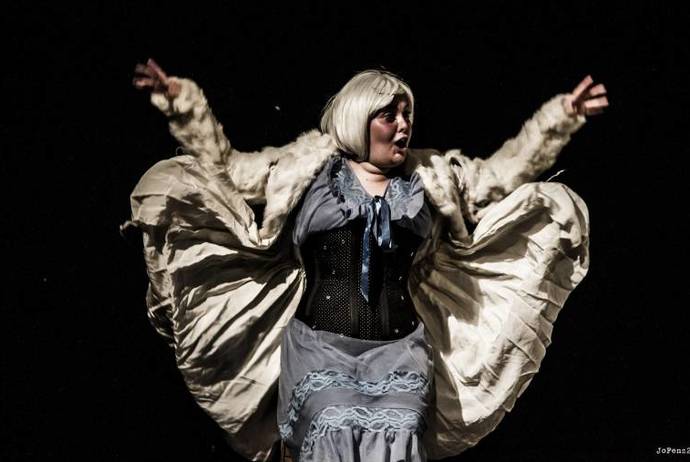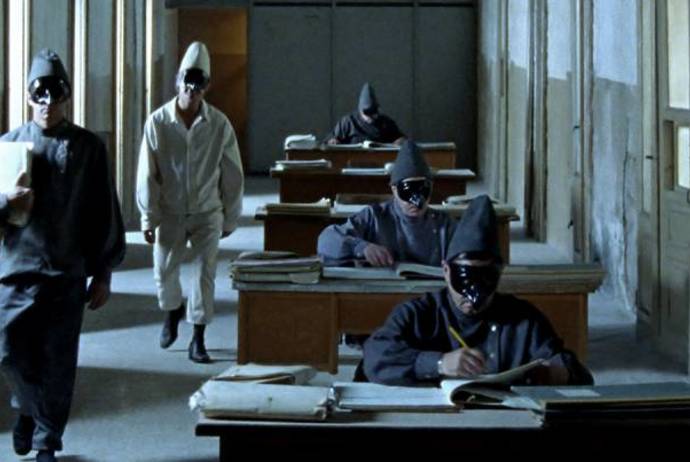The fourth edition of In Scena! Festival di Teatro Italiano has started with a bang with a special opening night dedicated to Italian playwright Luigi Pirandello. New York based theater companies of all different nationalities, in addition to the Italian participants who came to be in the festival, paid homage to the Nobel Prize Winner with a variety of pieces: some written by him and others inspired by his work, including Henry IV, The Late Mattia Pascal and The Twelve Letters.
Organized in collaboration with The League of Independent Theater, an organization for themakers of Independent Theater, the evening, held in Manhattan's historic Cherry Lane Theater, was a multi-lingual experience that successfully proved that theater knows no boundaries. English, Italian, Portoguese, Greek and Spanish, these are the languages actors used to give their interpretation of Pirandello's sublime work.
“Every year we dedicate the In Scena! Theater Festival to a prominent Italian playwright, director or writer and this year we have dedicated it to Pirandello,” Laura Caparrotti, the festival's artistic director said.
“This theater festival is important because it brings the world to us, right here in New York City,” actor and award winning filmmaker, Lucia Grillo, told i-Italy, after her unforgettable performance of The Twelve Letters, “Laura Caparrotti works extremely hard to share the experience of theater pieces she recognized as valuable and we owe her a great deal for it. The least people can do is help sustain – that way all involved can not only continue to put on quality productions free of economic difficulties but also so artists can be paid for her work. Humanity needs the theater. And of course there can be no theater without the artists! That's why I personally feel not only the honor of being part of this but also a duty.”
This year's edition of In Scena! is bringing to New York 5 different shows, all in Italian with English supertitles, presented by companies coming from different regions, from north to south, to provide several examples of the creativity that distinguishes the whole territory.
“Like all things that are newly born and take their first steps, there comes a moment where there is a need to slow down and take a lot at what has been done,” Laura Caparrotti has said, “In this edition, the number of shows has been limited, we only have five, because we want to dedicate a whole day to one show. It's a question of focus.”
The following is a list of the shows:
May 3, 7.30pm, Bernie Wohl Center at Goddard Riverside
May 5, Time 8pm, Triskelion Arts
Written and directed by Mauro Santopietro. Starring Mauro Santopietro and Alessia Giangiuliani. From Abruzzo.
Adam & Eve is a symbolic journey in seven scenes. Moving through historical eras to arrive at the present day, the play explores the endless dynamics between man and woman.
Pinocchio Fellini
May 4, 8pm, Center of the Arts at College of Staten Island
May 7, 3pm, Bernie Wohl Center at Goddard Riverside
Based on Carlo Collodi’s Pinocchio. Written and directed by Titta Ceccano. Starring Elena Alfonsi, Alessandro Balestrieri, Titta Ceccano, Julia Borretti, Danilo Sarego e Andrea Zaccheo. Produced by Matutateatro. From Lazio.
The story of the world’s most famous wooden puppet is reimagined inside a Felliniesque world with all its essential moments, including being the belly of the whale. Honoring Carlo Collodi’s 190th birthday, this youth theater production blends live music, choreographed dance, and shadow puppetry to illustrate the transformation of an impertinent wooden puppet into a sensible flesh-and-bone boy.
Diary of a Serbian Housewife
May 6, Time 7:30pm, Casa Italiana Zerilli-Marimò
May 9, Time 8pm, Triskelion Arts
Based on the novel by Mirjana Bobic Mojsilovic. Directed by Fiona Sansone, starring Ksenija Martinovic. Produced by CSS Teatro Stabile di Innovazione of Friuli Venezia Giulia
Andjelka is a young woman whose urge to relive her memories leads her to retrace the steps of her life: her childhood spent in Tito’s Yugoslavia, her adolescence and adulthood spent in Milosevic’s Serbia. This moving piece tells the story of an entire generation of young people living in war-torn regions who weren’t ready to become adults.
Cuoca Primavera
May 11, Time 6pm, Casa Italiana Zerilli-Marimò
May 14, Time 3pm, Bernie Wohl Center at Goddard Riverside
Written and directed by Chiara Cervati. Starring Chiara Cervati and Elena Trombini. Produced by Centopercentoteatro. From Lombardia.
Cuoca Primavera is a chef on a desperate quest to find the best ingredients for her dishes. Through many unforeseen hiccups – and a lot of laughter – Cuoca Primavera and her assistant teach children to pay attention to what we eat and to how the earth is treated, as well as to respect those who work the land to grow our food.
Ocean Terminal
May 13, Time 7:30pm, Bernie Wohl Center at Goddard Riverside
May 15, Time 7:30pm, Bernie Wohl Center at Goddard Riverside
Written by Francesco Lioce and Emanuele Vezzoli. Based on the autobiography of Piergiorgio Welby. Directed and performed by Emanuele Vezzoli. Produced by Associazione Culturale Teatri e Culture. From Lazio.
The life story of celebrated Italian end-of-life rights pioneer Piergiorgio Welby. Afflicted with muscular dystrophy, in 2006 Welby publicly declared his wish to refuse the medical treatment that kept him alive.
The program also includes a night of free verse – Free Verse Meets In Scena! On May 5th and 12th, and the Mario Fratti Award Ceremony, which coincides with the festival's ending, on May 16th.
The Mario Fratti Award is given to a new Italian play which is translated into English. This year's winner, selected among 100 submissions, is Emanuele Aldrovandi's Farfalle. “The play is about two sisters whose favorite pastime is a dangerous game: whoever holds the butterfly hairpin can ask the other one to do anything. Inspired by some of Pirandello’s short stories, Butterflies is a tale of personal growth and sisterly love in which self-discovery is not always accompanied by greater understanding of the other person.”
For more information: http://www.inscenany.com/







































